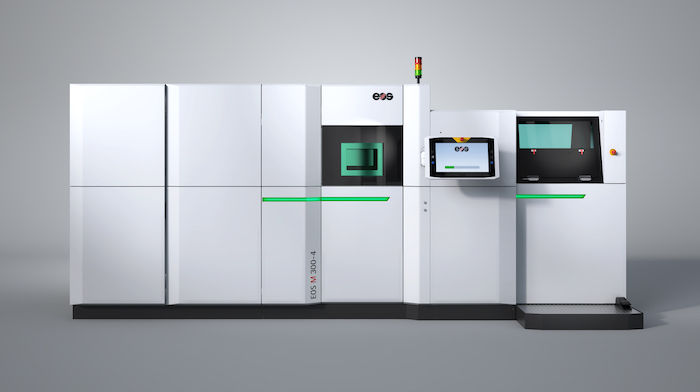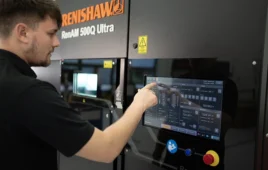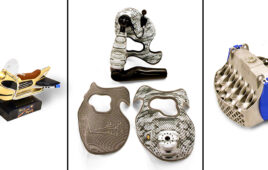The votes are in and the winners of the 2021 LEAP Awards (Leadership in Engineering Achievement Program) were announced in a digital ceremony with products across multiple categories, including Additive Manufacturing.
Critical to LEAP’s success is the involvement of the engineering community. No one at WTWH Media selected the winners. Instead, our editorial team did the arduous work of assembling a top-notch independent judging panel, comprised of a cross-section of OEM design engineers and academics — 14 professionals in total. This judging team was solely responsible for the final results.
In the category of Additive manufacturing, the winner of the Silver award is EOS for its EOS M 300-4 metal 3D printer.
Designed for industrial applications, the EOS M 300-4 offers multiple configuration options combined with safety and security features enabling digital Additive Manufacturing. The platform has the flexibility to choose the degree of automation that best suits your needs for an optimized workflow as well as the option to easily ramp up as demand increases. It produces high-quality components at a reduced cost-per-part. The 3D printer enables flexible adaptation to all individual requirements through various degrees of automation, helping to ensure optimal workflow.
The focus is on the productivity and uptime of the machine. The laser and performance stability ensure consistent part quality over the entire build space, including full coverage of overlaps. Up to four precision fiber lasers work over a 300 x 300 mm area, with each laser covering the entire space, improving productivity.
The platform is modular, comprised of the following self-sufficient modules: Process chamber, dispenser module, setup and unpacking module, and periphery module. Modules can be changed in the future, for example, a new dispensing module to connect continuous refilling setups, or open interface for 3rd party unpacking solutions, automated unpacking solutions.
EOS NickelAlloy In718, EOS Maraging Steel MS1, and EOS Aluminum AlSi10Mg are the three metal materials available for the EOS M 300-4, with more to come soon. EOS materials are specially developed for Direct Metal Laser Solidification (DMLS) and undergo strict quality assurance.
The winner of the Gold award is HP for its Molded Fiber Advanced Tooling Solution
The recycled paper packaging market is growing rapidly as manufacturers aim to reduce the environmental impact of product packaging. Molded fiber or molded pulp, typically made from recycled paperboard or newspapers, is used today for the handling and packaging of products from food containers to packaging of household items, industrial supplies, electronics to single-use medical service items.
What started as a push to avoid plastic straws and bags has grown into a much more concerted effort to drastically reduce plastic consumption. In Canada for example, at least six types of single-use plastics will be banned by the end of 2021, and countries around the world are following suit. The need to have better options available to replace plastic is increasing daily, and for a lot of applications in industries ranging from food and beverage to healthcare to electronics and more, molded fiber was always the answer.
Renewable in itself, molded fiber can also be made from many plant cellulose fibers, including bagasse, bamboo and wheat straw. While molded fiber has been a good packaging solution for decades, the investment required in the tooling process to create traditional molds has remained high.
HP developed a solution to this problem using HP industrial 3D printing technology alongside proprietary HP innovations in digital manufacturing software and data intelligence. The HP solution enables on-demand design and creation of molds for recycled molded pulp for packaging applications.
HP’s Molded Fiber Advanced Tooling Solution delivers a fully digital design experience enabling more efficient, optimized design and replacing the need for handcrafted screens, CNC machining, and manually drilled form tools.
The solution eliminates the time-consuming and intensive manual fabrication involved in the traditional molded fiber tooling manufacturing process. The HP printed molds can be turned around faster, in more innovative packaging designs, with the added benefit of high durability and ease of use.
Congratulations to this year’s winners!
Filed Under: Make Parts Fast







